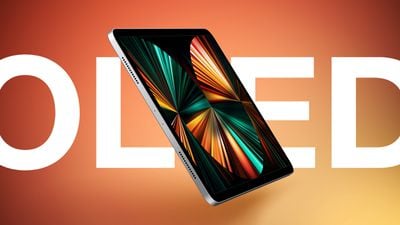iPad Pro OLED Display Production Reportedly to Begin Around February
LG and Samsung plan to begin mass production of OLED display panels for the next-generation iPad Pro models around February 2024, according to a report today from South Korea's Chosun Ilbo. The news was highlighted by the website OLED-Info.

Bloomberg's Mark Gurman expects new 11-inch and 13-inch iPad Pro models with OLED displays, an M3 chip, and an aluminum Magic Keyboard to launch next year. With mass production of the OLED displays reportedly not beginning until February, it seems unlikely that the next iPad Pro models would be ready to launch in March, a common month for Apple to announce new products. It seems more likely that the next iPad Pro models would be announced at WWDC in June or later, but Apple's plans could still change.
The current iPad Pro models are equipped with LCD panels, and the 12.9-inch model also features mini-LED backlighting for increased brightness and a higher contrast ratio. OLED technology would eliminate the need for backlighting, with benefits including even higher contrast ratio with deeper blacks, lower power consumption, and more. Apple is expected to use very thin hybrid OLED displays with a combination of flexible and rigid materials, which could allow for the next iPad Pro models to be slightly thinner.
There have been rumors about the iPad Pro adopting OLED technology for several years, and it seems that it will finally happen next year. The next iPad Air, iPad mini, and entry-level iPad are all expected to stick with LCD panels.
Apple last updated the iPad Pro line in October 2022, with key new features at the time including the M2 chip, Wi-Fi 6E and Bluetooth 5.3 support, hover functionality for the second-generation Apple Pencil, and support for ProRes video recording.
Popular Stories
Apple is not expected to release a standard iPhone 18 model this year, according to a growing number of reports that suggest the company is planning a significant change to its long-standing annual iPhone launch cycle.
Despite the immense success of the iPhone 17 in 2025, the iPhone 18 is not expected to arrive until the spring of 2027, leaving the iPhone 17 in the lineup as the latest...
Language learning app Duolingo has apparently been using the iPhone's Live Activity feature to display ads on the Lock Screen and the Dynamic Island, which violates Apple's design guidelines.
According to multiple reports on Reddit, the Duolingo app has been displaying an ad for a "Super offer," which is Duolingo's paid subscription option.
Apple's guidelines for Live Activity state that...
Apple is planning to release a low-cost MacBook in 2026, which will apparently compete with more affordable Chromebooks and Windows PCs. Apple's most affordable Mac right now is the $999 MacBook Air, and the upcoming low-cost MacBook is expected to be cheaper. Here's what we know about the low-cost MacBook so far.
Size
Rumors suggest the low-cost MacBook will have a display that's around 13 ...
Govee today introduced three new HomeKit-compatible lighting products, including the Govee Floor Lamp 3, the Govee Ceiling Light Ultra, and the Govee Sky Ceiling Light.
The Govee Floor Lamp 3 is the successor to the Floor Lamp 2, and it offers Matter integration with the option to connect to HomeKit. The Floor Lamp 3 offers an upgraded LuminBlend+ lighting system that can reproduce 281...
Belkin today announced a range of new charging and connectivity accessories at CES 2026, expanding its portfolio of products aimed at Apple device users.
UltraCharge Pro Power Bank 10K with Magnetic Ring
The lineup includes new Qi2 and Qi2.2 wireless chargers, magnetic power banks, a high-capacity laptop battery, and USB-C productivity accessories, with an emphasis on higher charging...
Now that the calendar has flipped over into January, steep discounts on popular Apple products have become more rare after the holidays. However, if you didn't get a new pair of AirPods recently and are looking for a model on sale, Amazon does have a few solid second-best prices this week.
Note: MacRumors is an affiliate partner with some of these vendors. When you click a link and make a...
Apple plans to introduce a 12.9-inch MacBook in spring 2026, according to TrendForce.
In a press release this week, the Taiwanese research firm said this MacBook will be aimed at the entry-level to mid-range market, with "competitive pricing."
TrendForce did not share any further details about this MacBook, but the information that it shared lines up with several rumors about a more...
The company behind the BlackBerry-like Clicks Keyboard accessory for the iPhone today unveiled a new Android 16 smartphone called the Clicks Communicator.
The purpose-built device is designed to be used as a second phone alongside your iPhone, with the intended focus being communication over content consumption. It runs a custom Android launcher that offers a curated selection of messaging...
























